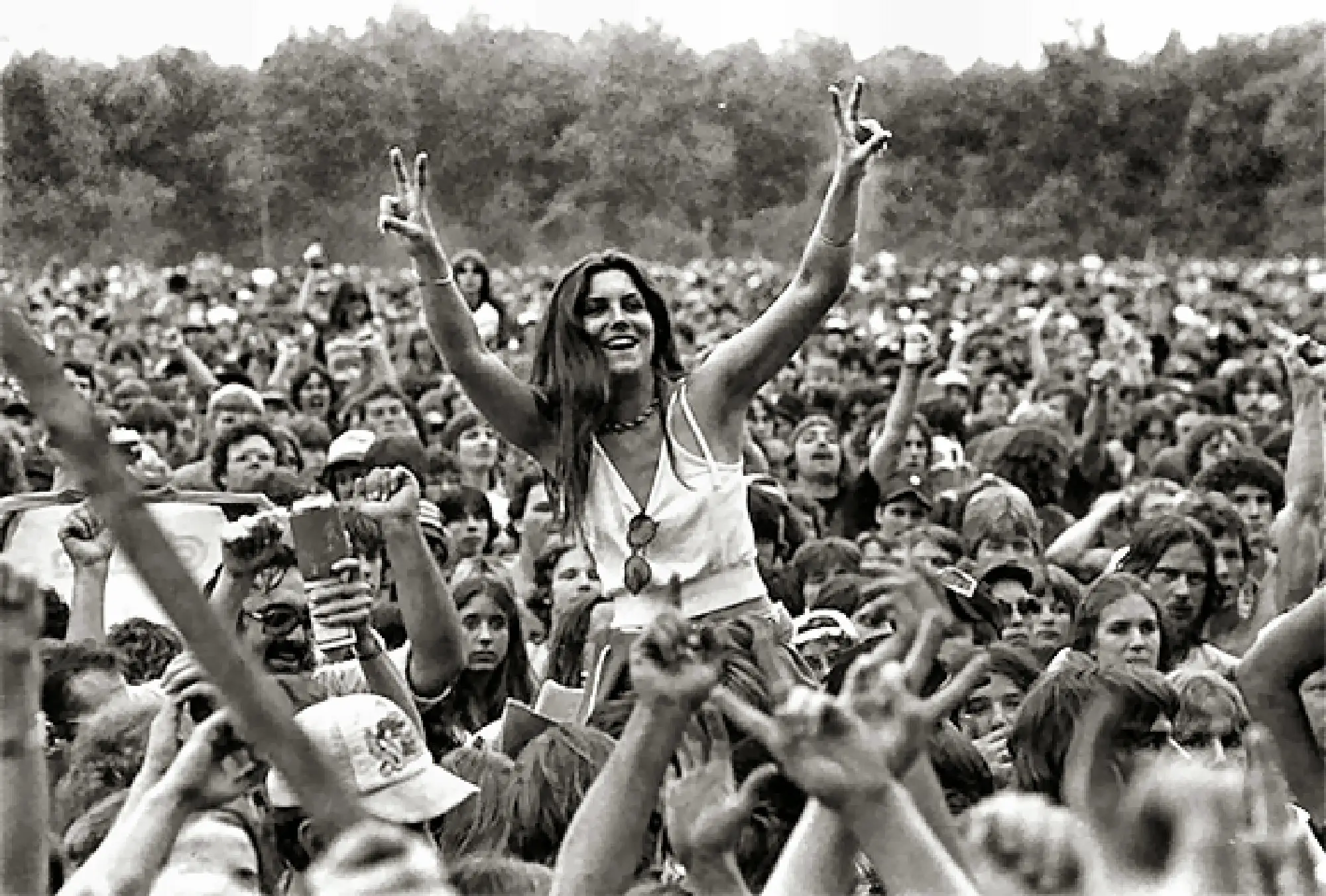
Fifty years ago, when I was 16 years old, a classmate from my high school in suburban Washington, D.C., called and asked if I wanted to go to Woodstock.
I wasn’t exactly sure what it was about but I had some time off since I had just finished a summer journalism course at a D.C. college and wasn’t due back at school until the first of September. I packed my sleeping bag. I was less than transparent with my parents, telling them I would be gone for a few days to a camping outing in New York State.
Seven of us connected and rode in a station wagon borrowed from a friend’s mother. We knew the line up of music was phenomenal but we didn’t know what to expect.
As we approached Bethel, N.Y. and Max Yasgur’s farm we were overwhelmed by car traffic. We had to park seven miles from the entrance. By the time we reached the gate, it had been crashed open and the event was free. I naively paid $20 for a ticket anyway.
An unimaginable number of kids wandered everywhere. The designation was a huge stage at the base of a half-moon shaped side of a grassy hill.
Guys wore Army jackets and girls were decked in buckskin dresses. Some had painted their faces. One guy who was leading a goat around on a leash wore feathers and a stovepipe hat.
I don’t remember when I first heard the music. It was hard to remember much since it was such a disorganized affair. I wasn’t using drugs or drinking alcohol. My group found a spare spot just a few feet from other concert goers and the stage. We unrolled our sleeping bags and claimed our space.
I recollect Joan Baez and Creedence Clearwater and many others, but Country Joe and the Fish stood out. He screamed at us: “Give me an F, give me a U, give me a C, give me a K. You got to shout louder than that if you want to end the war!” Then, “One, Two, Three — What Are We Fighting For?”
Vietnam was very much on our minds. The previous year had seen the Tet Offensive rip apart LBJ’s and Westmoreland’s lies about battlefield success. My group was lucky because at 16 and 17, we were younger than most of the guys who got drafted and the war was supposed to wind down with Nixon, the new president, although he hadn’t shared his plan to do so. Our chances of having to go were dropping.
By then, we had settled in to the Woodstock experience. It was very strange and not always pleasant. Couples would strip and make love right in front of us. A tripped out guy danced in front of a blond girl, opened his zipper and slapped his manhood against her nose. The air was thick with pot and hashish smoke. Plenty were dropping acid as an emcee announced on a loudspeaker not to take certain types of hallucinogens.
Those who did could go to aid stations for treatment. The Army had supplied olive drab Huey helicopters to medevac attendees in need of urgent care. We had seen Hueys on TV just about every night on the news but it was odd seeing one with a crewman wearing a bug-like helmet treating an overdose victim prone on the rear deck. After all, this was Woodstock, not Hue.
Our biggest fear was getting lost. We risked that when we went to find a portapotty or buy jugs of water at outrageously marked-up prices. I once lost my group for several hours but finally caught up.
It rained, turning the bowl-like hill into a mass of sloppy mud. People simple urinated on the ground and that flowed downhill in the rain on to our sleeping bags (I had to throw mine away later). Acts came on at all kind of odd hours, including 5 a.m. Doing this for three days and little sleep, I found that everything had become a blur.
Finally, we decided to leave and walked back to the station wagon, which we had forgotten to lock. A Puerto Rican man was fixing our tire that had gone flat. We thank him profusely and he said: “No problem. Just remember there is some good in Jose.”
Traffic was horrible and we tried to reach an interstate headed south by going through small towns. It was about 3 a.m. At one village, a local cop pulled us over. The driver was 16 years old. One had to be 18 to drive at night in New York. The policeman grew agitated. Then he saw the Sweet Tart candies someone had been eating in the front seat. The cop drew his gun. We quickly tried to eat as many as possible, saying, “Look officer, we’re not afraid! We’re not afraid!” He let us pass.
A few weeks later, we were back at high school. We discovered that a lot had happened that we didn’t know about until the movie was released the following year. We were unaware that scores of people were skinny-dipping at a nearby pond.
I was editor of the Blue and Gray, our literary magazine, and of course, we had to put Woodstock on the cover. It featured a photo of one of our group – the coolest looking one who wore a frumpy fedora hat.
We outlined the cover photo in pink since our school was really into macho sports like football. We wanted to poke a little fun as well as acknowledge the historic rock festival. The Jesuit fathers hated the magazine issue. I was summoned to the office of the Prefect of Discipline.

Leave a Reply
You must be logged in to post a comment.